Guide to power in Hamilton
Get tips on all things power in the Waikato.
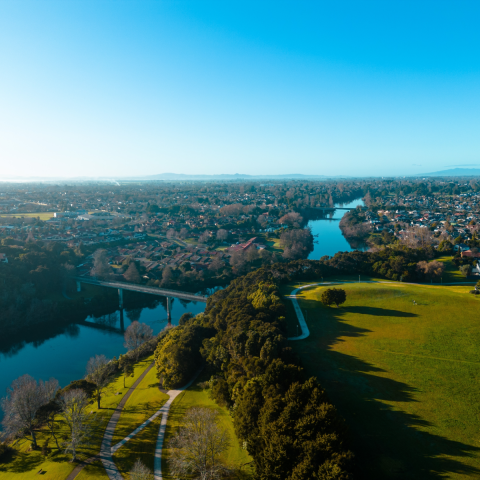
Get tips on all things power in the Waikato.
Is it worth driving an EV in Hamilton? Does the Waikato get enough sunlight to make solar a smart choice? And does the weather affect power usage? We explore this and more in this guide to Hamilton’s power.
If you’re simply looking for a new power provider for your home or business, here’s why we’re the choice for so many in the Canterbury region:

Power your home or business on your terms with our flexible Freedom Plan or enjoy price certainty with our Fixed Rate Plan. Tailor your energy plan to fit your needs. We offer options for EV owners and a competitive solar buy-back rate.

Our EV plans make home and business charging easy and convenient. To help when you're out and about, join Zero – one of the country's largest EV charging networks powered by Meridian, with more than 300 charge points.
We’re dedicated to making a positive impact in our communities. From the Kākāpō Recovery Programme to supporting KidsCan and communities that are striving to do good things with our Community Decarbonisation Fund, we invest in initiatives that matter.

Hamilton and the Waikato region gets its power from the national grid, which includes generation from around the country and via different sources like hydro, geothermal, wind and a smaller percentage of non-renewable methods.
Meridian’s generation in Waikato is the Te Uku wind farm. This 28-turbine farm near Raglan generates enough power for 27,000 average New Zealand homes and was built in 2009. Learn more about the Te Uku wind farm.
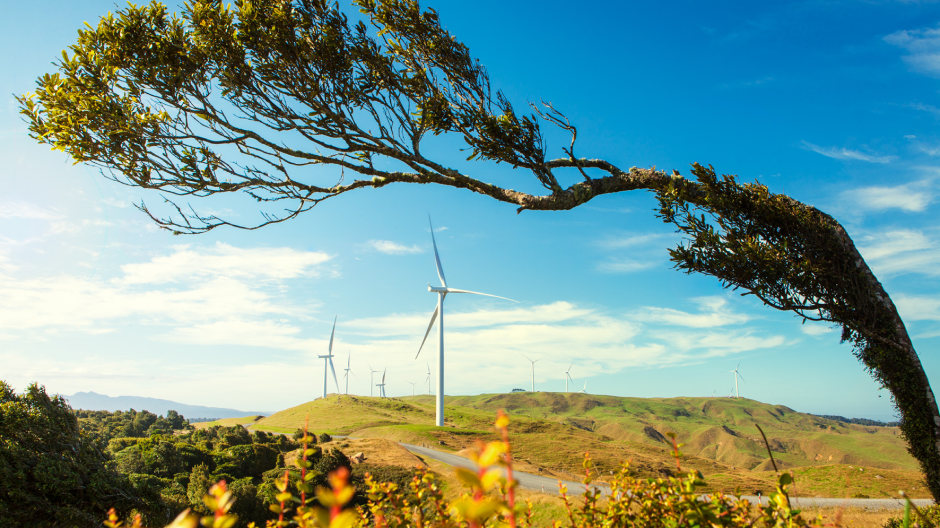
Waikato wind helps power thousands of homes and businesses via the national grid.
Waikato’s weather is fairly changeable throughout the year, with cooler winters and humid summers. With that said, it’s a reasonably mild region compared to places like the bottom of the South Island. Inland areas can experience more extreme temperatures (both hot and cold) than parts of the region near the cost.
Winter, like everywhere in Aotearoa, brings more demand for heating by homes and workplaces. Being an agricultural region, there’s demand seasonally for power to support activities like irrigation or heating for livestock facilities. Hamilton and the Waikato is known for a decent amount of rainfall, particularly during the middle of the year, as well as the start of spring in September – this of course may vary year to year.
The Waikato can feel quite humid over the year, which can require some ventilation of homes and businesses to keep the air comfortable. It’s worth noting that humid air’s temperature is harder to change than drier air. This means that if you’ve got a home or business that’s damp or humid, you’ll be paying more in power to cool or heat it. That is why a good ventilation or dehumidifying solution might be a good idea to use in the first instance.

Hamilton’s humidity can be tackled with good ventilation and for smaller spaces a dehumidifier.
While Hamilton’s not the sunniest place in the country, it definitely gets its fair share of sunlight with just under 2,000 annual hours. But whether or not solar is right for Waikato homes or businesses isn’t straightforward. You’ll want to consider cost, power needs and how long you’ll stay where you are.
Solar power comes with an upfront cost for the installation and system. While you will save on the power bill, it’ll take a certain period of time to pay back the cost invested. You can get an assessment done with a professional solar installation provider to estimate what this timeframe might be.

One of the considerations when deciding how much energy you’ll be able to generate (and therefore, savings), will be the available roof space. Knowing how much compatible roof area there is will go into the savings calculation.
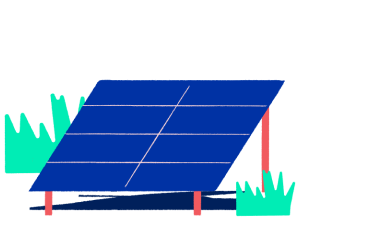
If you’re a farmer or grower within the Waikato region, you might consider how solar energy can integrate into the set up. You can chat to us about potential solutions to help power your agribusiness with solar energy.
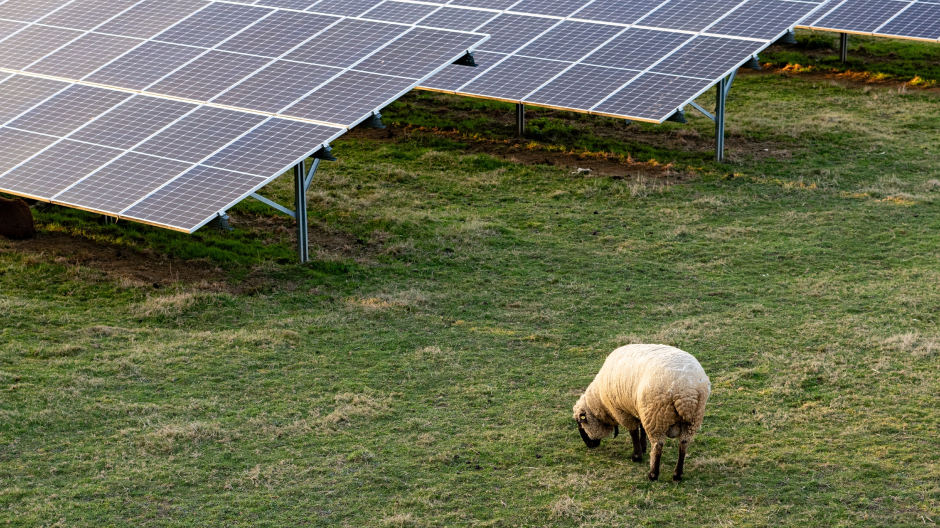
Solar energy is becoming more popular for renewable, off-grid power, but you should always weigh up the cost vs. savings.
EVs have seen a surge in popularity over the last few years with more models available and the promise of cheaper running costs. While this has slowed since Road User Charges were introduced and rebates removed, we’ve still got well over 70,000 EVs registered in New Zealand.
Hamilton is seeing more charging infrastructure introduced, including through our Zero network of public chargers. The city is reasonably flat and compact – supporting fairly efficient EV battery use. Then there’s the climate; a mild temperature range is great for EVs as the battery’s lifespan can be affected by very cold or very hot weather.
Going electric isn’t an option for everyone at this stage. While there are rural-friendly models gradually coming out, there’s still concerns around the ability to tow heavy loads or suitability for off-road use. So for those farmers across the region, do your homework on the vehicle’s capability before making the jump.
Meridian offers a special EV plan for owners to get a better deal from home charging.
Getting utilities connected like power is worth thinking about from the beginning of a new build project:

Typically you or your building company will need to inform the lines company about any new connections required. They can come out and provide an assessment and quote for the works.

Then you can chat to your power retailer to confirm details around metering and billing. If you get stuck with the process you can give Meridian a call.

The lines company will complete the works (usually via their contractor). They’ll work alongside the builders and project manager to coordinate this along with other earthworks and electrical work. This will often happen during other cabling like fibre connections.
Power outages happen for a number of reasons. If you’re experiencing a power cut right now, see the Hamilton Outage page for more information. Your lines company should provide status updates on widespread faults or maintenance. Meridian customer with no power to your home only? You can give us a ring.

We know how important it is for businesses in Hamilton to have utilities they can depend on. Our team and business plans provide excellent support and simple billing.

Want to offer EV drivers a way to charge up while they’re at your premises? Or perhaps your fleet of company vehicles is going electric. We can help you plan, install and maintain EV charging points.

Does your business want to find ways to operate more sustainably? Or perhaps find ways to bring your energy bills down over the long term? Meridian can help you put a solar energy solution in place.
We understand just how important it is for agribusiness to have services designed for their unique needs. Our rural team and farm plan helps farmers from Matamata to Otorohanga get more from their power.
Have a holiday home across the Waikato? If you’re a Meridian customer for your main home you can take advantage of our bach plan. This plan only charges you for power used, without the fixed daily charge. So the cost of that Raglan beach hideaway when you’re not there will be reduced. It’s also a great idea for anyone renting out their holiday home.
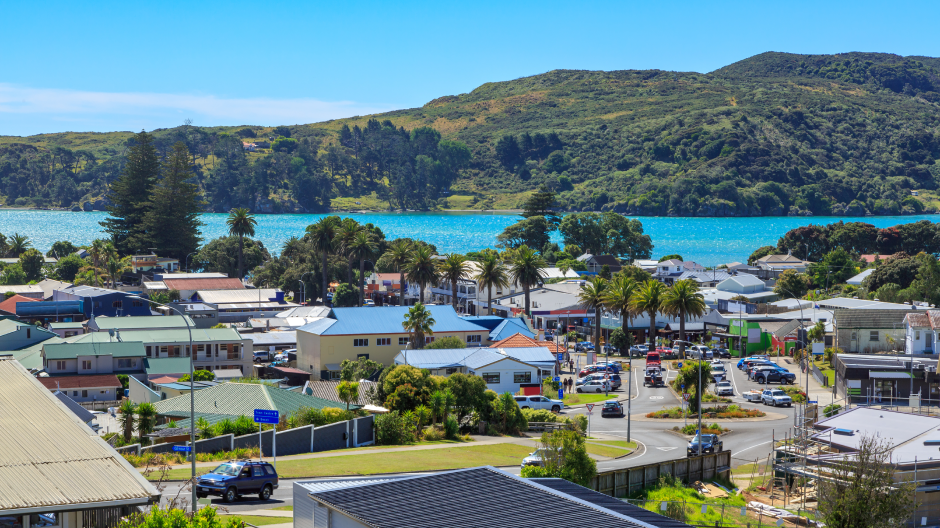
Your slice of paradise shouldn’t cost you big when you’re not enjoying it!
Got questions? Our team is here to help. Let’s talk about a quote or a power plan that’s tailored just for you.